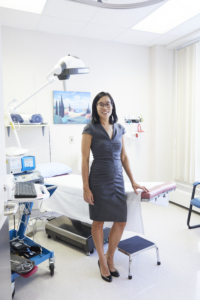Supporting young women with breast cancer – Dr. May Lynn Quan, MD.

Dr. May Lynn Quan, MD, Photograph by Todd Korol
A breast cancer diagnosis is scary for anyone. But for women under the age of 40, breast cancer comes with a unique set of challenges: The potential loss of fertility, prolonged hormonal treatment and managing young families and careers during treatment. University of Calgary researcher and cancer surgeon Dr. May Lynn Quan, MD, is developing an online self-management tool (an app) to support the unique needs of these women.
Quan’s team interviewed 34 women diagnosed with breast cancer at age 40 or younger, who were at least one year from finishing active treatment. These women identified key elements they would want in an app, including one-on-one peer group support, age-specific sexual health and fertility information, and increased support when living beyond the end of treatment.
Quan will take all the feedback to develop a supportive tool that she says is “by the women for the women.” This innovative app will be tested by a network of clinics across Canada when complete.
“When talking to these young women, we realized they need more support than they are getting,” says Quan. “Currently, their care is very fragmented – there’s a new patient clinic at one site, a surgical clinic at another and treatment at another,” says Quan. “The new Calgary Cancer Centre will bring all those services, that expertise, along with research, under one roof,” says Quan.
“To me, I think the biggest benefit of the cancer centre is that we will finally be in a comprehensive breast centre. Currently, breast cancer care is very fragmented – there’s a new patient clinic at one site, a surgical clinic at another and treatment at another. The new Calgary Cancer Centre will bring all those services, that expertise, along with research, under one roof and to capitalize (or leverage) on the proximity and necessary collaboration and coordination of services in a more organic way. “
“Right now, women are literally driving all over the city to get the care they need. It will make it easier for a natural marriage between our research efforts and bringing those into clinical reality. Actually implementing it and building these support tools with the patient in a collaborative way,” says Quan.
Click here to learn about the five critical areas in which we aim to tackle cancer.
You can help clinicians and researchers like Amanda perform world-class cancer research by making a donation to the OWN.CANCER campaign today.
Click here to Donate.



